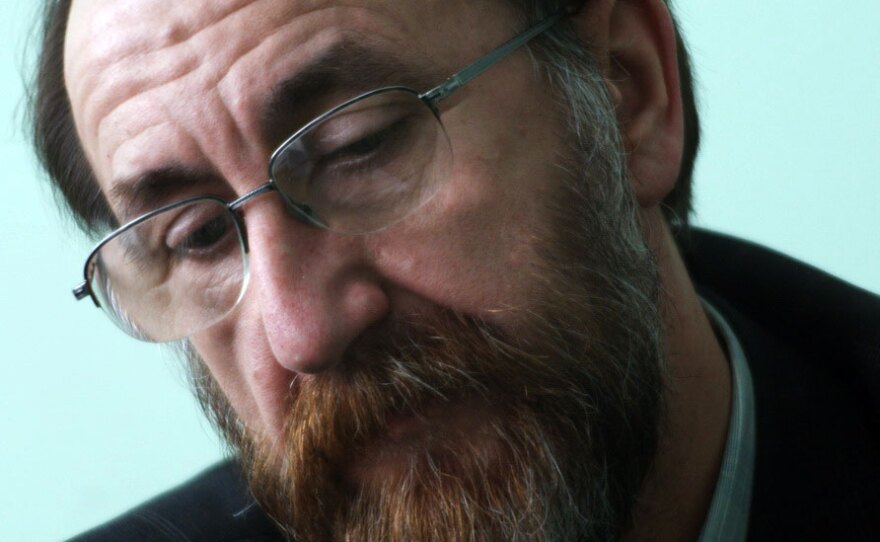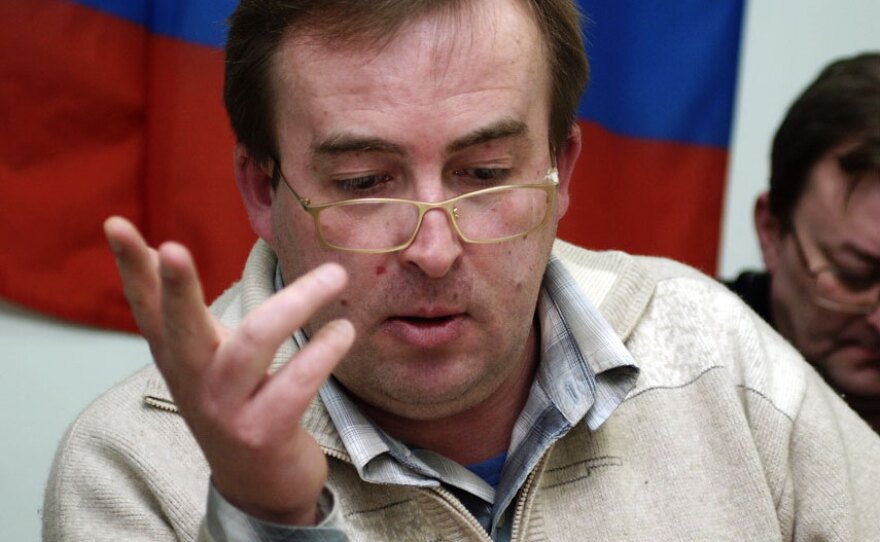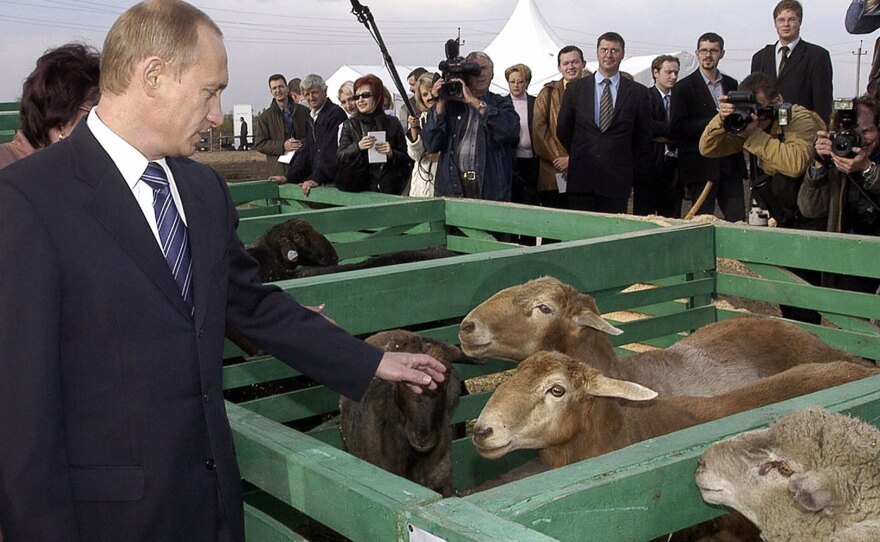Third of five parts
Far downriver from the gleaming high-rises of Moscow and the capital's in-your-face affluence, the Volga River city of Saratov is trying to catch up.
It is struggling, like so many Russian provincial cities.
As a center for the military industry, Saratov had been closed to foreigners during the decades of Soviet rule, and suddenly had to negotiate a globalized economy in the 1990s. Its main sources of income, weapons technology and agriculture, fell apart.
Private enterprise has taken its place, but development is slow. Russia's national economy has been buoyed by oil and gas -- an uncertain source of income -- and the Russian government's mantra these days is "modernization."
That's what the city of 875,000 needs to tap its considerable scientific and agricultural talent. But some in Saratov say Prime Minister Vladimir Putin and his ruling party need to pay more attention to the problems of cities like Saratov and share the wealth.
Putin's Agricultural Bailout
This area of the Volga basin, about 500 miles southeast of Moscow, is blessed and cursed -- it has some of Russia's richest land, but also some of its most unpredictable weather.
For years, an added curse was the state system of agriculture, which provided no incentives and produced little. That system collapsed quickly, along with the communist state, in 1991. Hundreds of thousands of acres sat fallow.
Slowly, though, private farmers have taken over abandoned fields. A market in seeds, fertilizer and farm equipment has emerged.
For the first time in living memory, Russia became a net grain exporter in 2007. But the record-breaking heat wave and drought this summer wiped out crops and hit the new farmers hard. The government has banned wheat exports until mid-2011.
Vasily Zhelydkov, 38, watched his wheat fields along the Volga wither earlier this year.
"Our grain harvest has failed completely," he says. "There was nothing we could do to combat 47 straight days of 108 degrees. Thank God the government has helped us with subsidies."
Zhelydkov says Prime Minister Vladimir Putin has improved overall conditions for farmers. He protected agricultural land from developers and extended cheap credit. In recent months, he has stepped in to help bail farmers out by deferring payments.
A big fan, Zhelydkov has become the local representative of Putin's party, United Russia.
"I like what the party is doing for society, and I also get advantages being in the party," Zhelydkov says. "I was alone to start with, but now when someone tries to mess with me, I have the power of the party behind me."
But it is that power that has many other Russians concerned.
Moscow's Overwhelming Power
At Saratov State Socioeconomic University, economist Igor Umansky says modernization can happen only when Moscow backs off and spreads Russia's resources.
"In the U.S., you don't have total concentration of everything in, say, New York. It's spread out. Here, though, Moscow is the financial, industrial, scientific and government center," he says.
Moscow is twice the size of St. Petersburg and six times the size of the next biggest cities.
"That's just not normal," Umansky says. "There remains a huge gap between Moscow and the rest of the country and its ability to develop."
Government plans to create a Russian Silicon Valley near Moscow don't make him happy. Umansky doesn't directly criticize the monopoly of the prime minister's party. But, like many other Russians, he does question the monopoly of the state.
"The state can't create innovative business. If you look at Silicon Valley, it wasn't the government which inspired the high-tech boom," Umansky says, adding that the biggest Russian companies have yet to invest at home the way they do in developed countries.
He says another big problem is freedom of information.
"The sooner this changes, the better it will be for the country and the atmosphere here," he says.
Volodya Onishchenko, a doctor visiting Saratov, says the government's continued control of the traditional media is poisoning the atmosphere and scaring off potential investors.

"Different elements of Soviet propaganda have come back, perhaps to compensate for a feeling of inferiority," Onishchenko says. "There are a lot of anti-Western, particularly anti-American, feelings these days on TV, and they are generated from above."
Thank God, he says, for the Internet -- that's where he gets his information.
But, in spite of the explosion of the Internet, Saratov journalist Darya Knigina worries that the overwhelming power of Moscow and Putin's United Russia party still has a paralyzing effect on people with something to lose.
Viacheslav Trofimov, a physicist in Saratov, tried to do just what the government is now urging: set up a company to tap the city's scientific talent and develop new ideas.
But he says he was blacklisted because he does not support United Russia.
"We were not their people, so they used all their powers to stop us by legal and illegal means," he says. "People who supported us realized we had been put on a blacklist, and that any investor in our company would face problems with the authorities, who all belong to United Russia."

The Dark Side Of United Russia's Reach
Based in Saratov, Sergei Pochechuyev worked for United Russia as a political consultant until he broke ranks in 2008. He has written a book describing how the local party machine uses a mix of illegal activities and domination of every institution to destroy anyone deemed an enemy.
"United Russia gets its money from businessmen who understand there is only one power in this country," Pochechuyev says. "If you want to succeed and have your problems solved, you need to pay into its coffers."
With that money, Pochechuyev says he was the master of dirty tricks.
"I was given a list of names of those who needed to be discredited," he says. "It became easier and easier to put pressure as power was increasingly concentrated in the hands of Putin's party. I could pay off editors, judges, you name it, to take certain measures," he says.
Pochechuyev now says he helped create a monster. He has yet to find a publisher for his book, and he has yet to find any viable opposition to Putin's political machine.
That would appear to be Russia's current dilemma. Many Russians interviewed along the river say they are not happy with what they now have. They say they face a combination of fear, caution and ongoing corruption, a cycle that is hard to break. Leaving Saratov and moving down the river aboard the cruise ship where he tends bar, Sergei Orlov weighs in.
When asked why more Russians don't protest if they are unhappy, Orlov says, "I just don't think my voice makes a difference. Our elections are a farce."
Pushed as to why he puts up with this, he just shrugs.
"What can I say?" he asks. "This is Russia."
Thursday: In Volgograd, the legacy of WWII's deadliest siege shapes a modern city.
Copyright 2023 NPR. To see more, visit https://www.npr.org. 9(MDAzMjM2NDYzMDEyMzc1Njk5NjAxNzY3OQ001))






